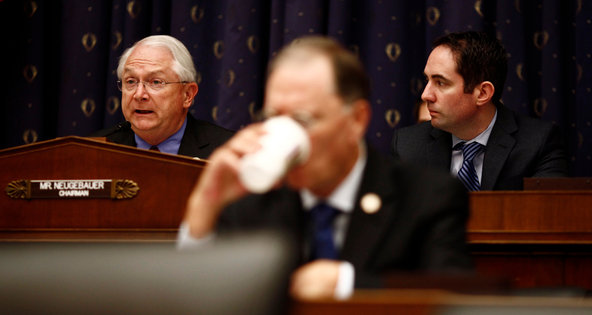 Luke Sharrett for The New York TimesRepresentative Randy Neugebauer, left, leads the oversight panel of the House Financial Services Committee.
Luke Sharrett for The New York TimesRepresentative Randy Neugebauer, left, leads the oversight panel of the House Financial Services Committee.
5:06 p.m. | Updated
Congress has eased demands that the Federal Reserve Bank of New York turn over thousands of documents that detail interest rate manipulation at big banks, whittling down the request and granting the regulator more time.
The reprieve will afford the New York Fed an additional month to comply, according to people briefed on the matter. The agency had been under pressure to meet a deadline on Saturday.
The original request for documents came in July, when the oversight panel of the House Financial Services Committee sought volumes of records about the London interbank offered rate, or Libor, which affects the cost of trillions of dollars in mortgages and other loans. The interest rate is at the center of an investigation that has ensnared more than a dozen banks.
In a letter in July, the oversight panel asked the New York Fed to detail its correspondence with employees from the banks that help set Libor. The oversight panel, led by Representative Randy Neugebauer, Republican of Texas, also ordered the New York Fed to turn over its internal Libor-related documents and any communication with other government authorities.
In addition to the one-month extension, the subcommittee is narrowing the scope of its request. Lawmakers are now seeking communications among government authorities and documents circulated internally at the New York Fed, the people briefed on the matter said.
Libor Explained
By steering clear of e-mails from bankers, the Congressional inquiry could avoid complicating a wide-ranging criminal investigation. Once the initial documents are received, Congress may still ramp up its request to include some information from the banks, one of the people briefed on the matter said.
The New York Fed already produced reams of transcripts this summer related to phone calls officials had with Barclays employees. Barclays was the first bank to settle accusations that it tried to manipulate Libor for its own benefit. It reached a $450 million settlement with the Justice Department as well as regulators in the United States and Britain.
Regulators and criminal authorities around the world are investigating more than a dozen other big banks, including HSBC and Deutsche Bank, in the manipulation of Libor, a measure of how much banks charge one another for loans. Banks are suspected of reporting false rates during the financial crisis to bolster profits and shore up their image.
The scandal has consumed the banking industry and called into question the New York Fed’s oversight powers. In the case of Barclays, the New York Fed learned in 2008 that the British bank had been submitting false rates.
During the crisis, when high borrowing costs were a sign of poor financial health, banks were artificially depressing the rates to project a stronger image.
Rather than push for a civil or criminal crackdown, the New York Fed advocated policy changes to the rate-setting process, some of which were adopted. But with the crisis in full swing, the New York Fed moved on to more pressing concerns, and Barclays continued to submit false rates.
The regulator’s approach has drawn sharp scrutiny from the oversight panel.
“As you know, the role of government is to ensure that our markets are run with the highest standards of honesty, integrity and transparency,” Mr. Neugebauer wrote in a letter to the New York Fed dated July 23. “Therefore, any admission of market manipulation — regardless of the degree — should be swiftly and vigorously investigated.”
This post has been revised to reflect the following correction:
Correction: August 29, 2012
An earlier version of a caption accompanying this article misstated the role of Representative Randy Neugebauer. He leads the oversight panel of the House Financial Services Committee, not the committee itself.
Article source: http://dealbook.nytimes.com/2012/08/29/new-york-fed-receives-reprieve-on-libor-request/?partner=rss&emc=rss
